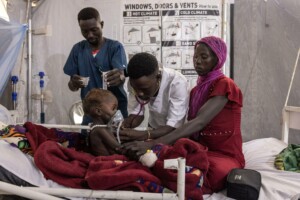Sudanese Unicef Deputy Executive Director appointed
United Nations Secretary-General António Guterres appointed Hannan Sulieman of Sudan to serve as the Deputy Executive Director for the United Nations Children’s Fund (Unicef) yesterday.
United Nations Secretary-General António Guterres appointed Hannan Sulieman of Sudan to serve as the Assistant Secretary-General and Deputy Executive Director, Management for the United Nations Children’s Fund (Unicef) yesterday.
Sulieman’s career with Unicef spans over 27 years, serving since February 2019 as Acting Deputy Executive Director, Management where “her expertise in management, operations, and policy have ensured optimal performance of several Unicef divisions”. She previously served as Chief of Staff and Director of the Office of the Executive Director (2016-2019).
Prior to her roles at the organisation’s Headquarters, Sulieman "served in Unicef regional and country offices and held Deputy Representative positions in Egypt and Somalia where she provided direction for programme planning and implementation to achieve country programme objectives. In this capacity, she oversaw Unicef’s programme response to the Somalia famine in 2011," according to Unicef.
Sulieman also previously served in the office of Relief, Recovery and Reconstruction of the United Nations Assistance Mission in Afghanistan (Unama), and started her career in her home country, Sudan, in the areas of gender and education.
In 2017, Unicef set out a new strategic plan in Sudan for 2018 to 2021, with an estimated budget of US$2.5 million aimed at child survival and development, education and learning, child protection, policy, evidence and social protection, and programme effectiveness.
In April this year, Unicef welcomed a landmark move by the Sudanese transitional government to criminalise female genital mutilation (FGM). The amendment to the Criminal Law Article 141 was endorsed by both the Sovereign and Ministerial Councils on April 22. Unicef stated in a press statement: “This comes following years of persistent and forceful advocacy by all stake holders; the NCCW, women and child advocates, donors including UK aid and the Swedish government, UN agencies, international and national organizations, community-based organizations and community members, especially those who came together and publicly declared to join the ‘Saleema’ movement.”
Aid package
On June 23, an EU shipment of 11 tons of medical aid items arrived at Khartoum International Airport, accompanied by a medical aid team of 35 people.
This second EU Humanitarian Air Bridge flight includes personal protective equipment (PPE) and medical equipment for medical staff and volunteers, in addition to medicines for the Sudanese Red Crescent, the World Health Organisation, Unicef, and other organisations which prioritise vulnerable people, including displaced people and others affected by armed conflicts in the country.
Radio Dabanga’s editorial independence means that we can continue to provide factual updates about political developments to Sudanese and international actors, educate people about how to avoid outbreaks of infectious diseases, and provide a window to the world for those in all corners of Sudan. Support Radio Dabanga for as little as €2.50, the equivalent of a cup of coffee.












 and then
and then